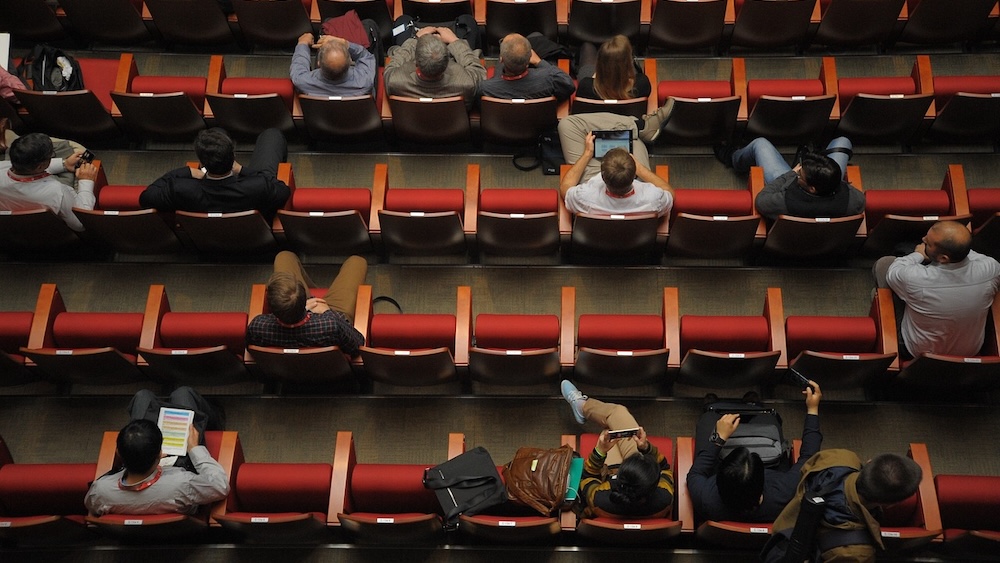


Organizers are seeing attendee levels drop and are unsure about other disruptions to come.
After Convene sent out an email invitation to participate in our pulse survey with the subject line “Is Global Uncertainty Affecting Your Events?,” I received an email reply from Patricia Andrade with “UMMMM YES” typed in after the question. Andrade is vice president of international marketing and compliance for ABTS, which specializes in managing housing, travel, and compliance for international attendees and sponsored groups at U.S. medical conferences.
We set up a call for Andrade to fill us in on how the current environment is affecting global medical conferences based on her direct experience. Andrade invited ABTS colleagues Patricia Aguilar, associate vice president of meeting and convention services, and Lauren Rangel, vice president of housing operations, to join us. Here are excerpts from our conversation.
LATAM
“The Mexican groups that we have for conferences in the fall want to confirm immediately, right now, this very second, because they are more worried about tariffs and taxes and how that fluctuation is going to affect their groups than they are about anything else,” Andrade said, regarding large-scale medical conferences in the U.S. “These are all doctors who are attending for CME education.”
Patricia Aguilar
‘They’re scared of the airport. There’s a little bit more scary feeling coming from [Asia].’
Aguilar referenced one Mexican group in particular, which, she said, wanted “to lock everything in as soon as possible.” Aguilar said that there is a misperception about “the situation in the U.S. — all that information out there about immigration and ICE [U.S. Immigration and Customs Enforcement] raids and grabbing random people off the streets. I think that’s just scaring a lot of people,” she said. The perception is that “it’s not worth the risk to go at this time,” and she’s finding sponsors are bringing fewer doctors to minimize their risk.
The group manager for a group in Mexico asked Aguilar if the stores were still open and were there a lot of people protesting in the streets in the U.S. People in other parts of the world see a lot of media about the situation in the states, she added, “and they don’t know necessarily what the reality is.”
She has found that other groups ABTS services from Latin America also want to confirm immediately. “We have a couple of other Latin American groups who are a little worried about the ability to get visas,” she said. “They are reducing their groups based on doctors who might already have visas or what the doctors are saying. There is a little bit of push from the doctors themselves — they are worried about coming. The sponsors are still willing to bring them here. We haven’t seen any huge, marked decrease in the amount of people that are coming from Latin America.”
EU and Asia
Patricia Andrade
‘They might be making a political statement, or they might just be uncomfortable coming to the U.S.’
Sponsors are willing to provide the money to bring doctors to conferences in the U.S., but Andrade said she has seen some of the European doctors turn down the invitation because they’re uncomfortable coming. “They might be making a political statement, or they might just be uncomfortable coming to the U.S. because of the instability with the political situation,” she said. A sponsor might be willing to have 65 grants, but only 45 people actually accept the grant invitation. “There’s a little bit of reduction in that. Again, it’s an individual choice of the doctor as opposed to a monetary choice of the sponsor. The sponsors are still really willing,” Andrade said, to move forward.
“I do have a group from the Philippines that says that they are really trying to back away because they are actually scared,” Aguilar said. “They’re scared of the airport, and they’re scared of just being mistreated once they get here. We’re hearing that a little bit more from Asia — there’s a little bit more scary feeling coming from them.”
Exploring Options
“We saw pushback during the first Trump term when there was the ban” on travel to the U.S. from certain countries, Rangel said. “We had very vocal groups that said we will not come because we’re making a protest against these policies. We did see an uptick in associations expanding their virtual offer to give people that protest option because at the end of the day, the product coming out of a medical meeting is the CME.”
Lauren Rangel
‘Breakfast prices already jumped dramatically because of inflation.’
Rangel said that now there is a great deal of uncertainty about how to navigate the situation.“ Nobody’s really sure what’s going to happen and there isn’t really a clear thesis statement coming out of the administration,” she said. “The truth is that a full-fledged virtual component is very expensive and has very low return on investment for associations and they’re very reluctant to do it because everyone up until now has been struggling to return to pre-pandemic numbers. A large part of that is bringing value to the cities and making sure you have good buying power and good rates — and virtual undercuts that. It’s this perfect storm of trying to make the inbound meeting as attractive as possible.
“We’ve had associations that are specifically concerned about international, not just because of the perception, but because historically the international participation is what adds value to their meeting. Even if it’s 20-percent international attendance — which is about the lowest slice for the conferences that we do — that’s very valuable for the membership because they get to hear the international perspectives, and it just adds that cachet of ‘This is truly a global meeting and truly high-level science because of the exchange of ideas.’ I think associations are very concerned. They’re watching it very closely. Obviously, they will do independently whatever is in their power to make it as attractive as possible.
“The most skittish I’ve seen is one association,” Rangel continued, “that historically had a lot of federal participation,” given the cuts to federal funding and staffing. “That’s affecting them overall, even more so than international participation, because it affects their room block. Then that means: ‘How much do we invest? How much can we slice out of the room block without being penalized?’ They’re thinking on those strategic terms and it’s quite sad, of course, because behind that strategy is the loss of medical service to underserved communities and research and dangerous diseases and things like that.”
Higher Costs
As far as inflation and rising costs, Rangel thinks “first and foremost,” the impact on events will be F&B. “Of course, that will affect us personally because of breakfast prices. Breakfast prices already jumped dramatically because of inflation,” Rangel said. “Eggs, the worst possible food item for breakfast, which will also affect the offer that goes into the convention center itself, because as a really brief example, the medical event we were just at has very long hours. They offer breakfast and lunch as part of the registration package, because they know that they’re keeping the doctors ‘hostage’ for so many hours throughout the day.”
In order to manage the increases, organizers will have to cut programming, she said, “or dramatically increase registration prices.”
Beyond the rising costs of the events themselves, Rangel said it will be “very interesting to watch taxes levied on the hotels themselves” in those destinations where the bed tax is supporting infrastructure development for conventions. “The tax calculation that was relevant two years ago is no longer going to be relevant if these tariffs hold, because the cost of construction and labor is going to skyrocket,” she said. “We’re going to see a lot more of these measures on ballots.”
“On a compliance side,” Andrade said, higher overall costs become “an issue even to the point of not whether they can pay or just whether it’s so expensive in comparison to what a similar meeting in Europe would cost per room, per F&B, per breakfast, that the companies themselves and their own compliance departments take a look at it and say, ‘Well, we can’t justify spending that amount of money. It’s just so out of our compliance scope.’ When in Europe, in France, you are only allowed to pay €175 per night — here, they have to make a case to pay $500 a night.”
Andrade explained that the French Sunshine Act (“Loi Bertrand”) allows for a hotel room maximum of €250 per night — including taxes and breakfast. “If breakfast is charged separately, as it is in the U.S.,” she said, “it should still not push the total over €250 per night. These limits apply regardless of the country where the event is held. So even if the medical conference is in the U.S., sponsors must adhere to these French caps when supporting French health-care practitioners.”
As a result, Andrade said, “You’re going to start seeing a lot more international doctors going to those meetings where they do get to interact with other international doctors. European international medical conferences are excellent — same level as here. It’s going to become an issue that we’re going to see more and more, the higher the prices are in the U.S., the more there are taxes, the more there are tariffs….”
Silver Lining?
“That actually dovetails neatly with what I was going to say,” Rangel said, “which is that right now the hope spot is that not all associations have good global competition. Even if there are in name comparable meetings in Europe or Latin America, they either don’t attract the same audience or the level of science isn’t quite there to the American counterpart. At the moment, it is still viable. The pharmas have the money to pay to send doctors.
“These are actually health-care providers who diagnose and prescribe locally. They do all of their business locally. Ostensibly, they should be free and clear to come. As long as the science in the United States remains the highest level available, there’s still hope. There’s still the flow of people and ideas.”
Rangel noted an additional wrinkle to the overall challenge of navigating uncertainties. “One thing to consider,” she said, “was the pandemic caused a lot of personnel turnover in the industry and in associations. You’re going to have people that maybe have just gotten their feet under them and now have this whole other crisis to take care of. There’s really so much unknown.”
“I would say the one positive thing that we have going for us,” Andrade said, “is obviously from what people are telling us from outside the U.S.: They still do want to come. The companies are still willing to sponsor. They’re just a little scared and worried. The associations just have to start telling people: ‘Everything’s okay, we’re still okay, we’re still moving forward. We do want you. We welcome you.’”
Michelle Russell is editor in chief of Convene.







